#best i could do y'all
Explore tagged Tumblr posts
Text


#best i could do y'all#network tv sucks#i'll remake them if actual video shows up somewhere#ryan blaney: beer scavenger#ryan blaney#joey logano
24 notes
·
View notes
Text




HYUNJIN | 241005 LIVE
#hwang hyunjin#hyunjin#stray kids#skz#bystay#createskz#skzco#staydaily#a9gifs#*gif#*ccarly#*hyunjin#*carly:hyunjin#late 2 this and too lazy to make a nine set or anything but#i did want to gif a Little of this#i could not find a fourth gif to match the other three well. but i did my best#hopefully y'all don't notice like i do <3
626 notes
·
View notes
Text


#i struggled alot w/ the coloring on this one y'all - i'll spare you the details but this was the best i could do - it was a whole thing#i mainly wanted to lighten it - reduce the harsh lighting on his face - and tone down the orange as much as possible w/out losing vibrancy#and i think i did that at least 🤷♀️ that wall color though 😡🤬#obligatory disclaimer that this is to appreciate lew not owen#lewis pullman#cw the starling girl#likearolloftape gifs
497 notes
·
View notes
Text
I've seen a lot of different takes on Fear Toxin/other fear causing stuff (Yellow Lanterns Ring or something)(later just called Fear Toxin cause I'm lazy) but here is another one.
Danny seems like he isn't affected by Fear Toxin because his biggest fear is that his accident changed him so much he is no longer human, he can no longer truly experience human things.
So when he gets lungful of fear Toxin, he feels normal. He was antsy before, because c'mon, it's a rogue attack but it's not worse. Or so he thought. Because the anxiety lingers. Not enough to register as abnormal just this slight hypervigilance that makes you see things about yourself and your surroundings that you'd never realize otherwise. He'd realize he doesn't blink as often. He'd realize that if he doesn't consciously focus, he sometimes seems to not touch the ground. Forgets to breathe. He can't feel his own pulse at time. He'd realize people will miss him when he's walking down the street as if he was invisible (people just don't care about everyone they pass by). When he'd look straight into his reflection, he'd look slightly to the left. Not enough to actually name anything that was wrong but just stretched enough to fall on the wrong side of the uncanny valley. If he just caught his reflection in the peripheral vision, it'd be vaguely shadowy creature with glowing green eyes and white smoke instead of hair. Overall he'd be just wrong enough to be distinctly not human.
For everyone else, he'd be just a dude. Literally couldn't find more normal dude than this dude. Will pass as absolutely normal human unless someone is specifically looking for ecto-ghost stuff. Even most magic users wouldn't clock him at the glance
Tldr: Fear Toxin makes Danny perceive himself as some sort of eldritch horror but not enough to make him believe he'd actually be affected, while from outside perspective he's Just A Dude™
#dpxdc#dc x dp#dp x dc#dcxdp#fear toxin#please no Ghost King#nothing against this au but i don't think it'll mesh well woth this idea#probably works best with danny soon after accident#maybe still believing all of his parents anti-ghost propaganda#that'd add to angst for sure#idk why he is somewhere where he could be affected#idk who would realize something is wrong#up to whoever wants to do expand on this prompt#he'd cry when someone tells him he's been in fact affected by fear causing thing#because this means he *is* human and while he was fundamentally changed by his death#it didn't fully get rid of his humanity#but he won't tell that too busy being relieved so whoever delivered the news would be in for the ride#actually it'd be cool if it was someone who has superpowers but they showed up later in their life#parallels y'know#... i may still not be normal about “i wonder what could lie beyond infinity” by Numinous_Scribe on ao3...#top notch fic go read it great Clark characterization#anyway because plot kinda escaped me#hope this idea scratches someone's creative braincell or something#im curious what y'all will make out of it#yellow lantern#have a nice day dear stranger who got to this part
394 notes
·
View notes
Photo
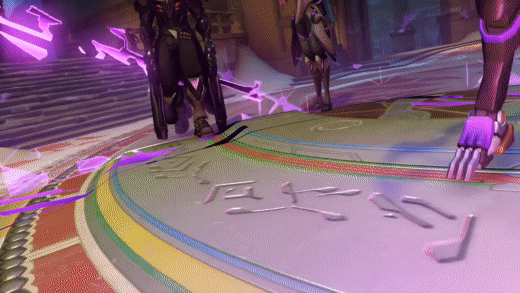
I cannot believe no one’s gifed POV Ramattra tilting your chin up with his staff yet. Must I do everything around here.
#Overwatch#Ramattra#I'm going to get SO many 'Your gif was used in a post' Notifications from this one I can feel it#I know you'll never see it but y'all using this gif in your Ramattra X Reader posts I see you.#I'm gonna read every single one of them#Best way to find Character X Readers is to be the person making the hot gifs of the character#I get SO MANY posts from that one Alastor gif I clipped and it wasn't even good#It's not good I don't know why people use it fdkjgkdfjkg#I tried to make it slower but using free online tools the only thing I could do was turn down the frame count#And we don't want that now do we#This is the second time I gifed an Overwatch Omnic for me myself and I#This is the higher quality of the two but the other is Max from last year's Blizcon#Funny considering gifs that loop like this bother my eyes and upset my stomach#but SOMEONE'S gotta do it it might as well be me
2K notes
·
View notes
Note
the paper mario web browser (not browser game)

#mario poll#is it a mainline super mario game#mainline super mario poll#mainline super mario game poll#what is a mainline super mario game#nintendo#super mario#paper mario web browser#did y'all know Nintendo commissioned custom web browsers based off their games?#because I didn't know that#Sorry for the bad image quality btw it was the best I could do
62 notes
·
View notes
Text
gonna be honest, feeling very conflicted about this episode, lads. i've been really hoping Protocol won't explain away the (NARRATIVELY IMPORTANT) mystery left at the end of Archives, i.e. Jon and Martin's fate, so seeing as they're the next thing Sam and Celia are gonna be investigating, this is kinda gonna be the thing that makes or breaks Protocol, for me.
i do think there's a solid chance Chester and Norris are the Jon and Martin from Protocol's universe, and that is something i absolutely would not mind. but i haven't actually made a post explaining why i think that, and i should probably do that before it's explained, just so i can mayyyybe say i called it.
(for the record, i'm pretty sure i came up with most of this before the series even officially dropped, when all we had was the ARG and the trailer. i haven't done much to connect this theory to the further information we've learned, so it's probably not fully accurate (if accurate at all). and quite a bit of it is kinda baseless conjecture; i'm just throwing my thoughts out there. just a little disclaimer.)
so!
in Archives, Jonah's primary motivation is fear of death. turning to the Eye is what allows him to body-hop as he does for 200 years, trying to create a world where his Patron reigns supreme, where he is seated upon its throne and cannot die. assuming his motivation is the same in Protocol, this new universe is (likely until recently) untouched by the Entities. if Jonah wanted to evade death, how could he do that without the help of an eldritch fear god?
easy—alchemy.

i'm not particularly knowledgeable about the subject as a whole, but i'm certainly familiar with the Philosopher's Stone (the symbol of which is also present in the OIAR's/podcast's logo, though it seems the OIAR is more focused on balance than on experimentation).
i also know that the seven metals used in alchemy (gold, silver, mercury, copper, lead, iron, and tin) are all components of computer chips. i've been thinking Jonah, or maybe his successors, saw that and began turning their research to how it could be utilized to extend—or preserve—life.
to cut to the chase, bc frankly it's hard trying to sound like i know what i'm talking about and this post would take forever to write otherwise, i think Jonah tried to Sergei Ushanka himself into a computer, because metal and plastic are a hell of a lot longer-lasting than a human being.
but he wouldn't shove his consciousness into some random motherboard without making sure it was safe, what do you take him for?? he is a man of academia. obviously he had to test it on others first, and then he'd do it himself.
cue the thought experiments the Institute ran on kids. the things the experiments quantify are empathy and obedience to authority, which to me screams that they were trying to find kids who were easy to manipulate into more dangerous experiments.
and who are two characters who were kids in the 90s, with circumstances that left them lonely, isolated, and who, even as adults, are desperate to please (whether a parent or a bad boss)? Jon and Martin.
i posit that Jon and Martin were both victims of these experiments, perhaps the first (and only) successful subjects, and Jonah uploaded his consciousness to the computer soon after. their records could have been stricken from the spreadsheet to hide that they'd even been part of the program, and given the Institute burned down soon after, and there were no survivors—it could have been assumed that they'd died in the fire. it isn't like they had the most doting guardians to worry over them.
...but Chester and Norris's voices are those of adult Jon and Martin.
best i can figure, Jonah's plan might have worked in the short term, but computers have had date/time hardware in them since the 80s, so they—and Augustus—are still aging. so they've been trapped in computer software since 1999, and now that Sam and Celia are digging into what happened, they're desperate to catch their attention and find a way out.
(and lastly, a fun little thought—given Jon and Martin were both born circa 1987, they would have been twelve in 1999. they didn't even get to be teenagers.)
#i could be way off base with this!! who knows. but i'm throwing it out there anyway Just In Case I'm Right#and if i am i will never shut up about it for the rest of forever. just so y'all know.#if this isn't what happens i do in fact already have notes for a fanfic lmao. childhood best friends anyone??#friday chats#the magnus protocol#tmagp spoilers#tmagp 22#tmagp theory#jonathan sims#martin blackwood#jonah magnus#chester tmagp#norris tmagp#augustus tmagp
73 notes
·
View notes
Text
"Colin should have grovelled more!" "Penelope folded too easily"
I think statements like this typically come from people who like Penelope. . .but don't really understand her. And don't really understand just why she cares for Colin, and just why him groveling would not in any way bring her peace.
Penelope and Colin are kindred spirits in their loneliness, in season 3 more than any others. Penelope had lost her friendship with Eloise, and Colin didn't really have a close friend circle to begin with. Except with Pen. Pen was the person he could put the mask down for, could open up to, (in particular with their 'dreams' discussion) and that's why he couldn't even entertain the idea of giving up talking to her in Season 2. She is a vital part of his life, and holds so much significance and importance to him.
I imagine that's what made their silence over his travels especially painful for him. They spent such a long time talking after Season 1, and he even informs her that her letters were so encouraging, that it helped him heal something inside of himself. That if she could see him in a gentle way. . .so could he. (And he repays this, because he is honest to god out here acting and looking at her like she hung the moon in the sky). But without her presence in his life, he spiraled. Didn't feel confident in being who he is, and thus put on his persona more firmly. We know this because he wrote in his journal that "I want to be less needy, less insecure, while still maintaining the core of my vulnerability that makes me who I am". That he misses his family, that he misses home.
And we know, from the books, that Home? Home is Penelope. Penelope is his North Star, is his guiding force, and who I argue he feels he needs. In his very first scene, he looks toward her house, tries to find her in the window. When he does not, he returns to his family. In the outdoor gathering, he looks for her and finds her, eager to talk. He states aloud that he misses her, and I imagine he wrote it, too. Not hearing back from her over the course of his travels was surely something that hurt him, but he doesn't hold any ill will toward her for it, only wants to reconnect again. In fact, the one and only time he brings up how he misses her and that she didn't respond, she makes very clear the reason why: she heard what he said and it hurt her. And he's ashamed of it.
Colin hears her call him cruel, and instead of ruffling his feathers about it, instead of getting upset, instead of having a chip on his shoulder as I feel so many men would about it. . .he understands why she does so.
Penelope is a woman who has been largely treated poorly in her society. She feels unheard, she feels undesired, and in her circumstances, and I can't help but ask myself. . .has anyone ever truly apologized to Penelope for hurting her, before? Her mother? Her sisters? Eloise, likely, but. . .anyone else? And the way Colin did? Because of all the characters in the show, Colin? Colin knows how to apologize. He has a lot of practice in it. And very importantly: Colin, a man of privilege in his society, apologizes. . .predominately to women. To Marina, to his mother, and multiple times to Penelope.
Ultimately, Penelope wants to be heard, Penelope wants to be understood, Penelope wants to feel desired.
And Colin checks every single one of those boxes. He informs he is not who he was before, and then he proves it to her. He hears that he hurt her, and he comments on it directly. An entire night apart, and he comes back to her 'Because I embarrass you' with 'I am most certainly not ashamed of you', replies to her 'I am a laughingstock' with 'you are clever, and warm, and I am proud to call you my good friend'. He hears her proclaim her own insecurities, and empathizes so deeply with her. He listens. He understands. He makes clear that he cares for her, and that she *is* desired. 'You lift my spirits' 'I seek you out at every social assembly'. That she helps him see the world in ways he loves, that he sees HER and how much she has cared for HIM, that she makes him feel appreciated, that he appreciates her, in turn.
And then? Then? He shows her. He tells her, and he shows her. His actions all throughout Season 3 reinforce this apology. He continues looking for her in every corner of every ballroom, he continues complimenting her, he laughs at her jokes and respects her boundaries, he is ever so gentle with her, he listens to her with an attentiveness that no one else has ever given her. To Lady Whistledown? Sure. But to Penelope? Who else in the entirety of that ton has listened to Penelope the way Colin has?
Absolutely no one.
Penelope Featherington ghosts Colin Bridgerton for months with no explanation, and Colin comes back wanting to reach out to her, and she finally tells him why.
And he apologizes. Because he listens. Really, truly listens. And really truly cares.
I need you to understand how rare that is, even nowadays, but especially back then. That Colin is the kind of man who can put his hurt to the side and realize he made a mistake, that he said something callous, and he adores her, and he can't lose her, and he has to see her and make it right.
Because that's why Penelope fell for Colin. Not because he's beautiful, not for his charm, not for his family. But for his heart. Because he shows her kindness in a world that so often disregards her. Because he seeks her out and tries to understand her, truly hears what she has to say and compliments her, says he's sorry and looks at things from her perspective.
Because he saw her when she was invisible.
Penelope Featherington, who grew up in a house that made cruel jabs at her, has Colin Bridgerton come to her and say he regrets what he said, and that he was wrong, and that he understands why she's mad at him. Penelope Featherington who has so rarely had much of anyone tell her that they're sorry for what they said about her, sits before Colin Bridgerton as he professes how much she means to him. That he cannot even spend a full day away from her knowing they're on bad terms with each other without making it right. That he sees how she is hurting and he has to in any way he can amend it. She is lonely, with no one really in her corner at the start of season 3, and she feels like she lost it all, and Colin comes to her and says 'no, I'm here and I appreciate you and you are special to me, please let me in and let me prove it'. Is it any wonder why after she shakes his hand, she stands in the sun, and she feels the warmth of it, she can smile? That she can breathe, again? That she can be truly content for the first time in the season?
Because Penelope Featherington does not want Colin to beg. She knows him. She knows the tender, full heart he hides behind the new cavalier persona. She knows the soft underbelly of Colin Bridgerton.
He never had to grovel. All he had to do was love her. Assuredly. Fervently. Loudly. Unapologetically.
And he does.
#polin#penelope featherington#colin bridgerton#bridgerton#sorry y'all i just have a lot of feelings and i need to get them out like they invented love what am i meant to do witH THAT INFORMATION!?#they just care about each other so much and so deeply#and they see the best in each other#penelope was hurt but she never HATED him#penelope was hurt and when she said 'i never thought you of all people could be so cruel' she also knew. . .he isn't#he isn't cruel#he's a young man trying his best in the world and he wanted to fit in and that made him say something hurtful about her#but he has a history of uplifting her#and he continues to do so#not one bad word about penelope all this season#'you are penelope featherington. . .never forget that' (you deserve the world) (you are amazing)#colin bridgerton said 'i love you' over and over this season and in the seasons before but we didn't hear it because we thought#it was only professed in one language#'you really are very good you know that?' 'you only wanted to keep me from heartache' 'what could possibly measure up to all that?'#'that you would never forsake me' 'you are pen. . .you are my friend. . .you do not count' (i could never give you up)#'i will always look after you penelope'#they are friends to lovers but there is love in that friendship#a deep beautiful love they have with each other#and sorry i'm ugly crying but i just adore them
125 notes
·
View notes
Text









iykyk (x/x)
#remaking not the first gifset i ever Posted but the first i ever Made.... many other things i could work on but i did this instead#mike 'girls? 🤨😒🤔😖' wheeler#(he's doing his best)#will and el diverging on either side of mike during catesgate.... y'all know how i feel about willelmike blocking (unwell)#gay mike wheeler#mike wheeler#mikesbasementgifs
268 notes
·
View notes
Text
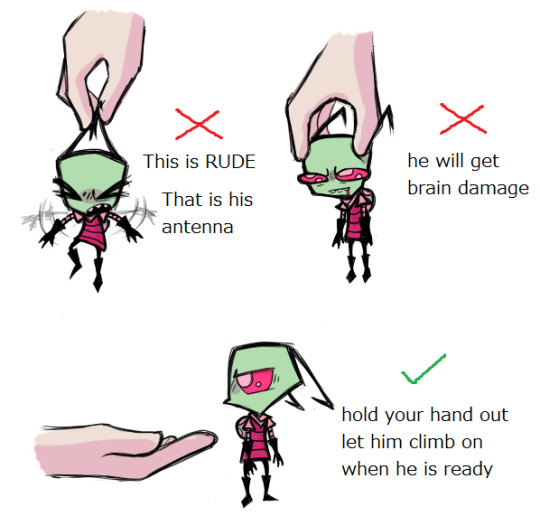
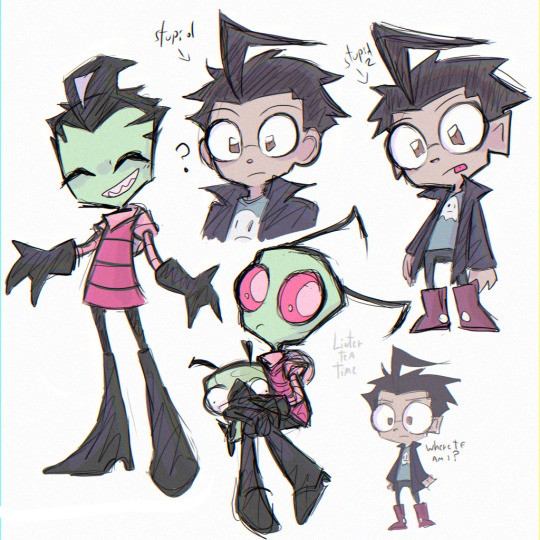


Some random iz stuff I didn't knew where to put so they all get thrown together
#fanart#my art#invader zim#dib membrane#gir#A meme#some doodlez and a human au thingy#what a group... Anyways if some of y'all are interested I could make more human au thingys#mostly because designing things is cool af for me#best thing in the world#but otherwise it was a cool neat little thing to do for zim ✌
648 notes
·
View notes
Text
CDPR I just wanna throw it out there before tomorrow comes that I know you guys crafted a well-constructed narrative full of twists and turns that will present difficult choices for me to make based on loyalty and our need to survive, but unfortunately you failed to take into account that I am still horrendously attached to my Keanu Reeves-shaped brain tumor and thus any decisions I make throughout Phantom Liberty will be directly influenced by what makes him happy and/or ensures his survival. Sorry to all the other characters you introduced into this DLC but they won't mean as much to me as the greasy-haired rockstar in my head who smokes like a chimney narrates Pulp Noir on my morning walks and enjoys getting choked out during sex.
#Cyberpunk 2077#Phantom Liberty#Johnny Silverhand#Truly is the saddest scrungliest man........I have no choice but to love him for all eternity#Someone in the DLC could be like 'Hey I got Johnny's body here if you want it all you gotta do is shoot Myers for it'#And I'm sorry but it would be like a speedrun of Of Mice and Men. I would do it so fast the narrative itself would get whiplash#Sorry that y'all made this DLC only for me to completely ignore my freedom in favor of things that benefit my best buddy :)#Aldi speaks
374 notes
·
View notes
Text
BABYMETAL IN LEAVE IT ALL BEHIND
#the amount of content we're getting is sickening ngl😭😭#this song is honestly so good babymetal is the best part of course but that guitar solo at the end??? sheesh#CAN WE PLS TALK ABOUT MOMOA'S LINES?!?! AND THE FACT THEY GOT INDIVIDUAL CAMERA SHOTS LIKE DID Y'ALL SEE THAT SHIT?!?!#ONCE AGAIN WE ARE SO FUCKING BACK#GAAAH I COULD CRY#AND SU DOING STRAIGHT UP AEGYO IM DEAD#su stop doing that before i put you in a sandwich and eat you💔💔🤧🤧🤧☹️☹️😭😭#stream leave it all behind RIGHT NOOWW#babymetal#sumetal#moametal#momometal#momokometal#f hero#bodyslam#leave it all behind
97 notes
·
View notes
Text

#kirby#daily kirby#my art#digital#hal laboratory#nintendo#(edit: it's been found thank you! original tags preserved below)#I cannot for the life of me find one specific reaction image and its source post#the one where the person is coming to in a hospital bed after a surgery#and they try to eat their own fist#and get stopped#and make big wibbly confused crying faces#it's smooth line images interspersed with text#does anyone have it?#cuz that '🥺???' was me most of the day and I wanted the image so I could convey it#but I Couldn't Find It#and neither my wife nor my best friend have any idea what image I'm talking about#so they can't help#(my partner isn't very online so there's no point asking them lol)#do any of y'all have it pls#I want the original post but I can't even find the standalone reaction image which should be enough to find the post#I've found one iteration of someone drawing their oc in the meme format and that's as far as I got even with as much as I remember about it#favorites
97 notes
·
View notes
Text
thinking about just how likely it is that Batman was the only person Harley told about having suicidal thoughts whilst in Arkham in Detective Comics #831
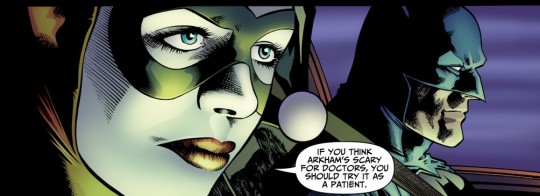
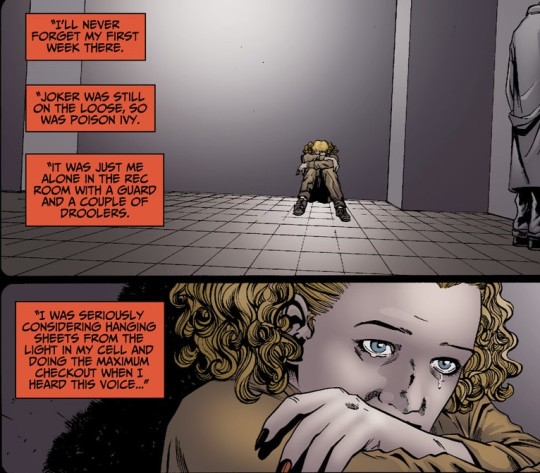
"I was seriously considering hanging sheets from the light in my cell and doing the maximum checkout when I heard this voice..."
Detective Comics #831
and how he knew when she strapped that bomb to herself in Batman (2016) #100 that he had to go after her because she was going let herself die in an attempt to end Joker's rampage for good but that she refused to physically do it because he didn't want to her Kill him and he told her that so she's found a middle ground

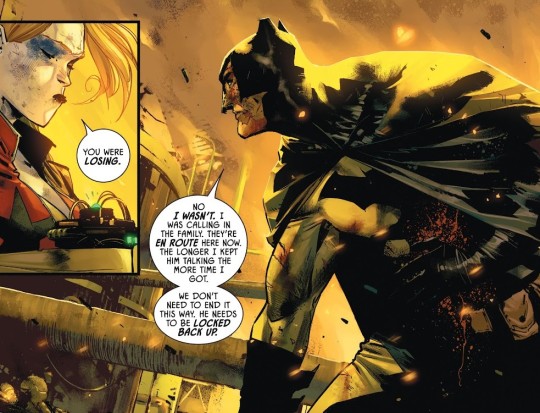
"We don't need to end it this way. He needs to be locked back up."
that she'd rather die than keep living with his presence in the world haunting her, haunting Them.
That if he did choose Joker, she wasn't going to disarm the bomb herself.
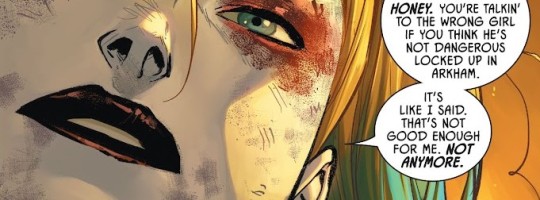
"Honey. You're talking to the wrong girl if you think he's not dangerous locked up in Arkham. It's like I said. That's not good enough for me. Not anymore."
the way he yells for her as she leaves.

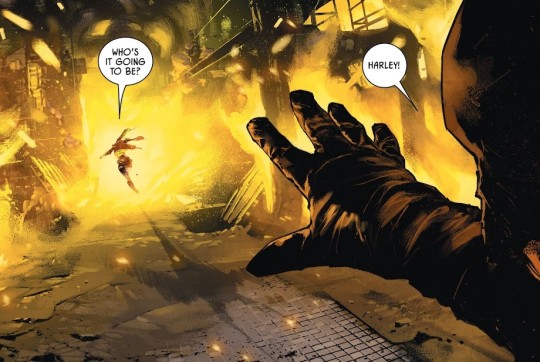
"You're only going to get to one of us in time, Bats. Who's it going to be?"
"Harley!"
the way the two men stare at each other in the way they have so many times before, in those moments when Joker stayed or prioritized their fight over her. the way he knew Joker loved the thrill of it all and thought it was funny, thought there was No way Batman would leave him and that this game had to end as according to the rules. And that Batman would do so, he would follow the rules and save him. The way he immediately assumed Batman would choose him, choose his life and choose to stay and disarm the bomb.
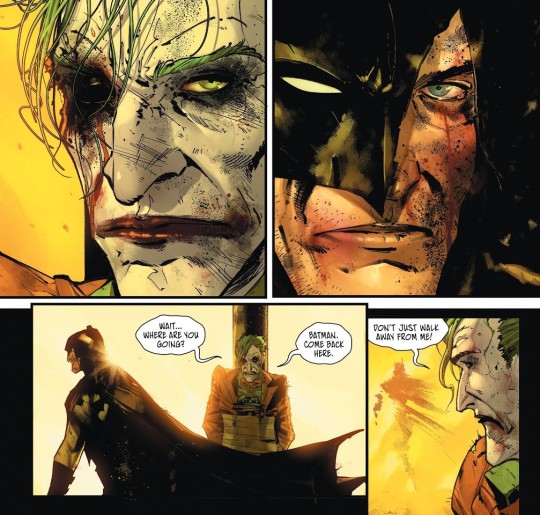
And how Batman didn't do that. How Batman walked away from him, leaving him to die or escape or whatever, because He was choosing Harley and her safety and prioritizing her life over him.
The way he stared him in the eyes before choosing the woman Joker had always left to die over him. The way that it was always Him, it was never a question if he would choose Batman over her, but when faced with that type of scenario, Joker is the one that gets left behind to die.
The way she literally woke up in the hospital instead of them having a scene just outside after he removed it. because she didn't intend to live in one of the two options. the way the bomb probably did go off to some capacity because you don't just end up in the hospital knocked out for a week.
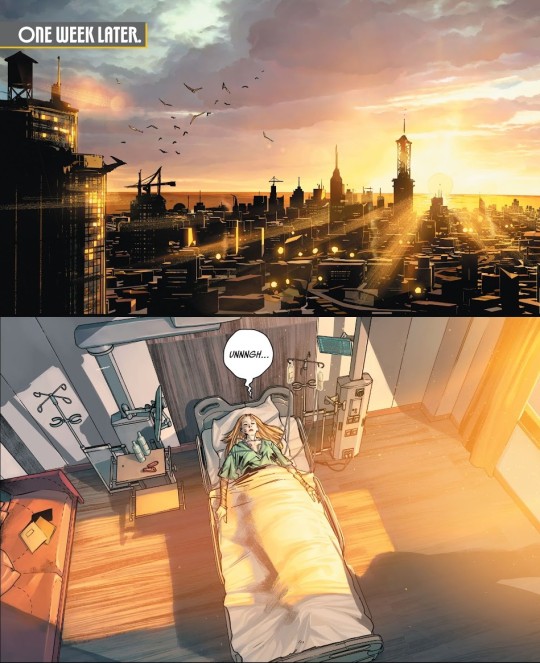
Him saying that he's glad she's okay, after everything they've been through, this war and Everything else. and the way he didn't brush off her concern
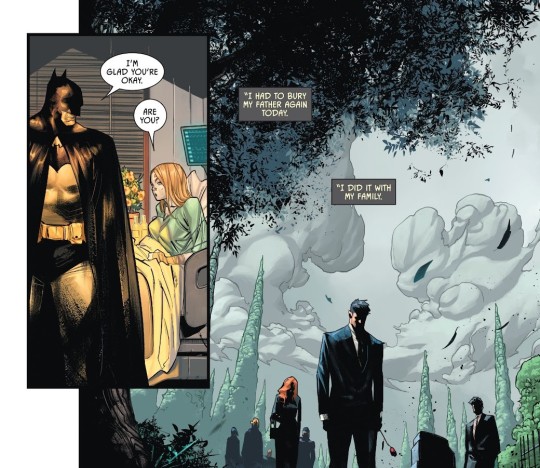
"I'm glad you're okay."
"Are you?"
"I had to bury my father again today. I did it with my family."
i just, i can't,,,,, i cant
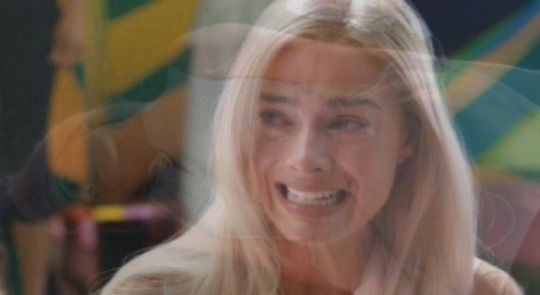
#have i told yall how much i love batquinn because i really fuckin do#they make me miserable and emotional in all the best ways#we deserve more well written content with them FUCK#and like she COULD have killed that fuckin man when she shot in through the eye but she didn't because she knows how he feels about Murder#even tho j*ker had exposed his identity and was about to horrifically disfigure him in such a similar way to how he permanently changed her#and led her to believe he was going to do AGAIN#during the rebirth death in the family arc when she thought he was going to carve off her face#like she had such a solid reason to just kill him and she could have defended it to batman but she still didn't break that rule#that she knew meant so much to him because shes trying and she doesn't want to ruin the budding trust they've got#and just#i cant#i cannot do it y'all#AND SHE KNOWS HE'S BRUCE AND SHE DIDN'T MAKE A BIG DEAL OUT OF IT BECAUSE IT WASN'T SOMETHING BATMAN WANTED EXPOSED#BUT SHE KNEW SHE KNOWS#she heard J*ker say it right before she shot him#and like that just also something she knows he didn't want her or anyone (let alone fucking j*ker) knowing so her aiming for a non deathblo#just#tw abuse mention#tw clown boy#tw blood#tw suicide mention#harley quinn#harleen quinzel#batman#bruce wayne#dc comics#batquinn#♧ comic thoughts ♧#♢ meta & analysis ♢
241 notes
·
View notes
Text
I'm not ready to shut up about Aveline and Carver--so, when you go see Aveline in Act 1, you can catch up with her a little bit and that's where this conversation can happen:
Aveline: "It's just one more change, though. The real end for me was Ostagar. What about you, Carver? You were there. Do you feel something similar?" Carver: No. Aveline: All right, then. Bit of a tit, your brother.
I wanted to see what she would say if Carver isn't in the party. Instead, she says this:
Aveline: Carver was there. I imagine he feels something similar. If he allows it.
......well, at least she didn't call him a tit?
#dragon age 2#da2#carver hawke#aveline vallen#she's slightly nicer to him when he's not there but she's still like 'maybe he feels something similar but probably pretends not to'#like i'm not gonna pretend that carver doesn't bottle any feelings--he doesn't openly talk about bethany a lot for a reason#but to suggest he pretends to be unfeeling about things like ostagar is incorrect like he CLEARLY feels a lot about it#because he associates the battle at ostagar with losing his home and sister to the darkspawn#after playing as a warrior hawke who is best friends with aveline i do have a little more insight into why she might think this about carve#when hawke is a warrior they were at ostagar. they share that traumatic experience with aveline and if they're friends#they discuss it in a way that i think aveline *wants* y'know? but with carver he doesn't respond the way she wants him to#so she gets frustrated since even if she tried to talk to hawke about it... hawke wasn't there. hawke doesnt KNOW what ostagar#was like but carver does... but it's like aveline is ready to assume the worst of carver a lot of the time?#like 'carver doesn't talk about it because he's a tit who pretends not to feel' is the vibe i get from this but aveline...#that's like calling you a tit because you don't want to openly discuss all your feelings about your dead husband#listen aveline and carver are so similar but they have such key differences like they both survived the horror of ostagar#and lost a loved one to darkspawn while fleeing lothering AND they both blame hawke for it to a degree#even though they both know that's not right and that it wasn't really hawke's fault#they're both stubborn warriors with daddy issues looking to find their place#and when it comes to flirting? well i don't think carver's as bad as aveline#but i played MotA i know all about 'you could tame its wild heart'#but the key differences come in how they the end the game y'know? especially if carver's on the friendship path as a warden#i still haven't made him a templar but something tells me he ends up more on the same road as aveline#vs when he's a grey warden and able to be away from kirkwall and find a place on his own#y'all i could write a whole essay on aveline and carver but i paused my game to write this so i should go back to that sksksk
40 notes
·
View notes
Text
Abuse, Silence, And Why Kevin Can Fuck Himself
I recently finished watching Kevin Can Fuck Himself on Netflix, and, aside from being the most brutally honest portrayal of domestic abuse I have ever seen, I discovered a beautifully written examination of narrative as power and silence as abuse and how this manifests in our larger culture.
Without going into too much detail, the show is filmed in two distinct styles that are interleaved throughout each episode to tell a cohesive story. Allison and Kevin’s relationship as seen by the rest of the world is told through a multi-cam, laugh-track sitcom that depicts a very typical “goofy husband, shrewish wife” mainstream comedy. Allison’s life through her own eyes is told through a single-cam drama/thriller about Allison planning to murder Kevin to escape his abuse.
It’s an absolute masterclass in screenwriting, but more than that, every episode explores the difference between truth, fact, and reality, and how none of these things are quite as much or as little as story. But while the process of transforming the chaotic and plotless reality of life into a story is as involuntary and essential as breathing, misogyny and the degradation of women is just as ubiquitous in our society, and a story that exists at the expense of another person’s lived reality is a refutation of their humanity.
It's also just a great show for anyone who likes to engage with history (or reality TV or true crime or “real life stories” in general), because while we have to tell ourselves stories about her own lives, we have to tell ourselves stories about other people as well. Eternal silence is narrative death, and the perpetual silence of an unspoken narrative is often the last death we can visit on someone whose story we’d rather ignore.
I also pulled up some books – Lolita and Disgrace – that dealt with similar themes, but from the perspective of the abuser. And what strikes me the most is that, across three beautifully written stories about narrative and silence within a culture that normalizes abuse, Allison, who began her story within a state of narrative death, was the only point-of-view character who had any chance of surviving.
One of the main themes of Kevin is that a compelling story is often a story that reinforces what we already believe or like to believe, and while the story may be factual and true it often also exists at the expense of someone's lived reality. The exact same series of events can be a silly joke or a harrowing tale of abuse depending on the lens through which we view it, but historically we've only been willing to see the multicam, laugh track, sitcom perspective on unbalanced relationships.
The alchemical process of turning a series of disjoint facts and experiences into a narrative creates something new and compelling, and erases much of what previously existed. In this way, it’s entirely irreversible. We spin our experiences into a very thin thread, a story we can tell ourselves that elicits something within us, something we need in order to live with the complex, uncertain, and unsatisfying reality of life. In think in many ways the thing we elicit in ourselves is truth. But truth is both more and less than fact, often more a reflection of our own beliefs and desires than the events of our lives. And in telling that truth we may never stray from the facts, but we almost by definition cannot give voice to another person’s reality.
There's a scene in season 2 of Kevin when Allison is hit by a door – a la the classic excuse – because of Kevin’s carelessness. And while he absolutely did not hit her, the way it's written is such an incredible allegory for how Kevin has curated their story and curated their friends' and family’s perceptions of their story such that even if she tells everyone the exact, unvarnished truth of what's happening to her and begs for help, they will only be capable of seeing the laugh-track, sitcom, “Kevin is a harmless goofball and his wife is a total shrew” perspective on the events of their lives.
As so often happens with abuse, their friends and family saw Allison being hurt because of Kevin. But the alchemy of creating a narrative around Kevin and Allison is irreversible, and the series of events they witness can only be spun together to a joke, an accident, a silly, childish mistake. Allison’s reality, Allison’s pain and fear, is completely elided. Like a lost sound in the middle of a sentence, her experience goes silent, and their larger understanding of her relationship never has to change. And you feel so acutely how Allison lives her entire life in that silence.
Storytelling is human, it’s essential, there’s no other way to engage with our own lives. And it’s not lying. It’s never lying to tell the truth. But it doesn’t reflect every reality, either, because another person’s reality can’t be reflected within our own narrative, because that’s what it means to be another person. To spin two different threads.
And because narrative is the essential process by which we understand our reality, denying someone their own narrative, or denying that this narrative be heard, is inherently abusive. To allow someone a voice is to give them humanity, and to suppress it is to strip that humanity away.
Disgrace, by J.M. Coetzee, follows the story of a professor, David, who rapes a student and then fails to protect his daughter, Lucy, from being raped by intruders in their home. He destroys his daughter’s life – not through failing to protect her, but through twisting her rape into a story about why the rape of his student wasn’t wrong. The main theme of the book is generally considered to be exploitation, but Coetzee doesn’t deal with the exploitation of the rape. That’s too direct, too immediate, too easy for the reader to understand as misogynistic and wrong. Rather, Coetzee delves into “the innocuous-seeming use of another person to fill one's gentler emotional needs” (Ruden).
The rape is how we understand David as a fundamentally exploitative person, a person who denies others their humanity by converting them into a vessel for his own desires, who erases their voice in order to speak through them and give himself the things he needs. And that’s how we recognize that the way he absorbs and claims the stories of his daughter and his student is another kind of violation of their humanity. Another way of turning women into vessels for men’s pain and fear and need.
What’s fascinating is that David's student finds her voice – files a complaint against him – and is eventually able to continue with her life. The woman he raped is less damaged by him than his own daughter, because she was the woman he couldn’t permanently silence.
In Lolita, another brilliant novel about abuse, dehumanization, and storytelling, Humbert turns to the reader at the end and says, “Imagine us, reader, for we don’t really exist if you don’t.”
It’s not that Humbert knew he was fictional, but that he knew everyone was fictional. Believed the entire world only truly existed in his own mind, because anything beyond that was irrelevant to his needs. He coped with the collapse of his ability to dehumanize Dolores (who he called Lolita) by demanding that his voice be resurrected. Demanding immortality. Demanding his narrative exist in another person’s world, and thereby be given the existence and humanity that Allison and Dolores and Lucy and David’s student were denied.
Pushing his needs, finally, onto the reader, because we are the only person he has left, and a person like him can only exist through the use of another. In that way, Humbert was powerless. In that way, Kevin and David were powerless, too.
In Disgrace, David’s dream is to write an opera, and at the end of the book he realizes he’ll never finish his magnum opus. He’ll never be able to terminate the process of converting himself, his world, into a story. But he does learn to decenter himself in that narrative. And it’s when he loses all fear of death, and any conception of the self, that he gains the ability to give dogs – who he generally equates to women – a voice within his opera, his life’s work.
It’s in death that we discover our true unimportance as human beings, that we learn to let go of vanity and our conception of the self entirely. And David had degraded women so thoroughly in order to justify how he used them to meet his own emotional needs that it was only in losing all value for his own life that he could gain the ability to see them as equal voices. To actually put those voices into his own life story. It's at the cost of himself that he allows other people to truly exist, in the death of the self that he finally allows the world to exist outside of himself. It’s almost a positive character arc. Almost.
When Kevin finally loses the ability to abuse Allison, he, like many abusers, loses all desire to live. His world was built on a structure of superiority and inferiority, on beings and vessels, on the inherent value of men and the inherent meaninglessness of women’s lives. The system on which he based his entire reality has been destroyed by Allison’s declaration of the self. And, if he was a being because she was a vessel, then in losing the ability to treat her as a vessel, to fully and completely dehumanize her, he has lost his own humanity.
It may be perfectly summed up here: “Become major. Live like a hero. That's what the classics teach us. Be a main character. Otherwise, what is life for?” (Coetzee).
If you’re not to be a main character, if there indeed is no split between major and minor characters, between people and the paper dolls that populate their story, between living beings and the vessels into which they pour their need – what is life for?
Nothing. At least, not for people whose narrative must exist at the expense of another.
And that’s why I say that only a narrator like Allison could survive this kind of story. Despite beginning her story trapped in eternal silence, her reality fully elided no matter how immediate and obvious it became, Allison was the only point-of-view character of any of these three stories who didn’t establish her power through the degradation of another. Who didn’t conceptualize the world via being and vessels. Whose narrative didn’t exist, by necessity, at the expense of another person’s humanity. Whose thread could exist in a larger tapestry without destroying her sense of self.
Don’t get me wrong, she’s not generally a likable character. She’s misogynistic, cruel, selfish, jealous, desperate, afraid, and in pain. Like anyone in an abusive relationship, she’s not at her best, and she’s often pushed to do things that are ugly and disturbing because she’s simply been pushed too far.
But, for me, the power in her character is in how her last scene never felt like a final scene. Her story didn’t have to be killed, her conception of the self didn’t have to be killed, in order to reveal the brutal reality of stories twisting and intertwining without any inherently superior truth or narrative among them. Allison’s story was one of declaring herself. And that’s why it didn’t feel like it ended at the end. Instead, this felt like a beginning.
#this is probably the most egregious 'post that no one asked for' that I've ever written#but man this show HIT me y'all#and then I went back and reread parts of disgrace and that hit me too#it also made me reconsider my online presence and how I myself engage with narrative in the very small little world I'm a part of#I caught some shit a while ago and made a conscious decision to never comment on the narrative around the beatles#and to be clear I was just talking about a general narrative in society at large I wasn't bringing up anything specific or attacking people#more how larger social narratives filter into and sometimes come to define individual stories#but it was upsetting to people and I figured instead I can just try to express a compassionate perspective on the mentally ill myself#but now I wonder if I've gone too far#idk without naming any names I'm getting unblocked by people who should definitely still find my mindset intolerable to their worldview#and I don't blame them because we all have reasons for the things we believe and we're all just doing our best#but it's a canary in the coal mine#it makes me think I've become so focused on not ruffling feathers that I'm tacitly approving some disturbing beliefs#and I think I could have happily ignored that if I hadn't just watched this show#posts that no one asked for#kevin can fuck himself#kevin can f*** himself#op#longer rambles
33 notes
·
View notes